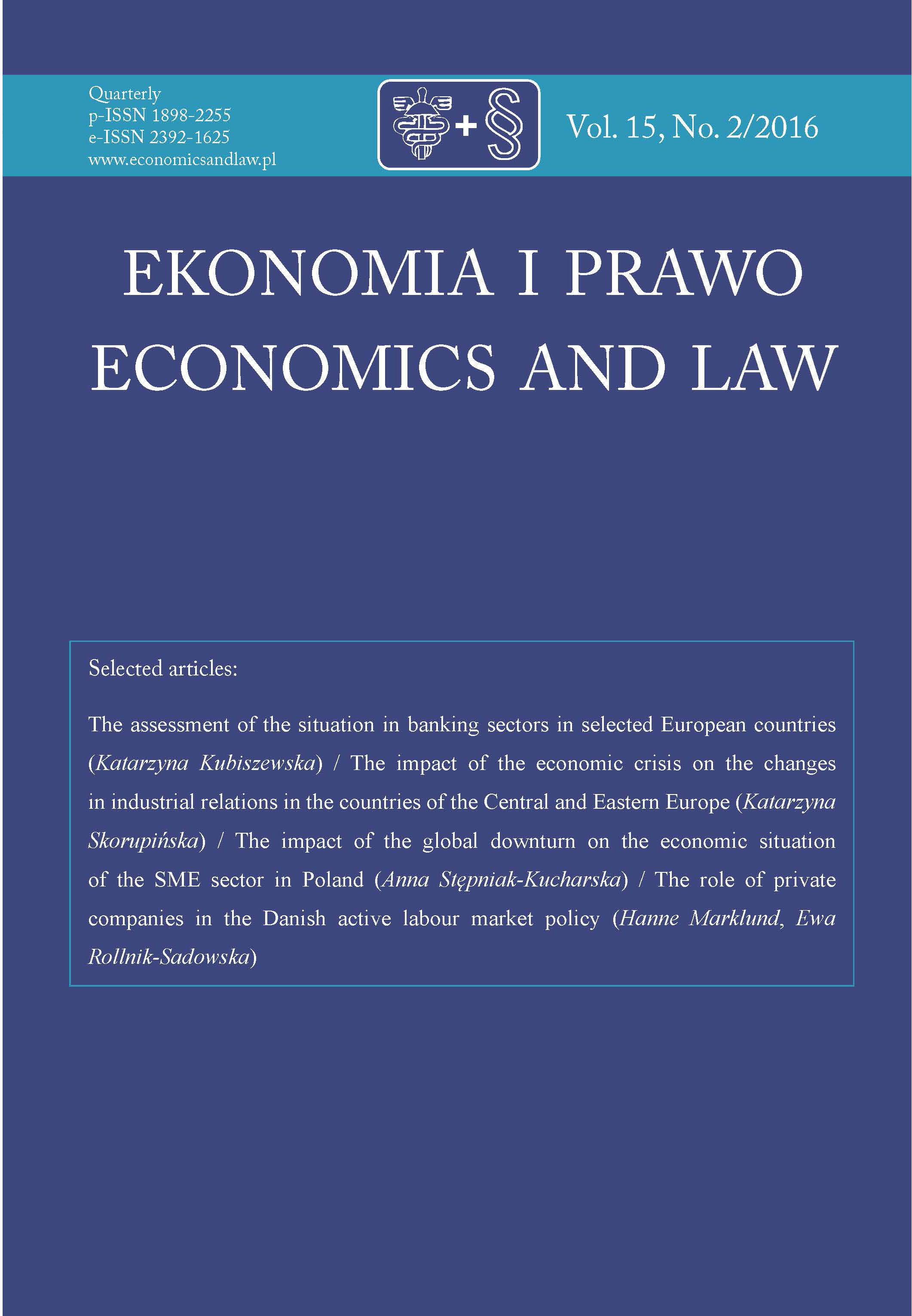THE ROLE OF THIRD SECTOR IN ECONOMIC CRISES
DOI:
https://doi.org/10.12775/EiP.2016.011Keywords
institutional changes, European Union, nonprofit sector, charities, independent sector, voluntary sector, social economyAbstract
The aim of this study was to present the role of third sector in economic crises with the particular case study of its role in the last economic crises in Europe. The economic crises brought about a reduction of both government funding and corporate giving, also decline in income from philanthropy. Most responses from the third sector were reactive and passive in nature — reduction or freezing of wages, dismissal of workers, shutting down existing and delaying the beginning of new programs, and the reduction or cancellation of services. However some of the actions were more proactive. These can be divided into two groups. The first one is external in nature. Statutory activity of the third sector has focused on the introduction of programs and initiatives designed to counter the effects of economic crises and increasing the transparency of doing business, in particular financial operations. The second type of activity is associated with the still unappreciated role of the third sector as a business player. Nonprofit organizations can ameliorate the impact of an economic crisis by making efforts to maintain their activity despite zero or negative rate of return diversifying funding sources and entrepreneurship, increasing cooperation with other sectors (governmental and private).References
Acocella N., Zasady polityki gospodarczej. Wartości i metody analizy, PWN, Warszawa 2002.
Anheier H.K., Neue Wächter für die Banken, “Die Zeit”, No. 10/2010, http://www.zeit.de/2010/10/Finanzkrise-Forum (09.08.2015).
Anheier H.K., Salamon L.M., The Nonprofit Sector in Comparative Perspective, [in]: W.W. Powell, R.S. Steinberg (eds), The Nonprofit Sector: a Research Handbook, Yale University Press, New Haven and London 2006.
Bank Information Center, http://www.bankinformationcenter.org (22.04.2016).
Binmore K.G., The Evolution of Fairness Norms, “Rationality and Society”, Vol. 10, No. 3/1998, http://dx.doi.org/10.1177/104346398010003001.
Bretton Woods Project, http://www.brettonwoodsproject.org (22.04.2016).
Bugajski J., Ekonomia społeczna, nowość nie tylko polska, http://www.sprawynauki.edu.pl/index.php?option=com_content&task=view&id=1443&Itemid=1 (09.08.2015).
Corporate Europe Observatory, http://corporateeurope.org (22.04.2016).
Corporate Watch, http://www.corporatewatch.org (22.04.2016).
ERSTE Stiftung, http://www.erstestiftung.org (22.04.2016).
FairPensions, http://www.fairpensions.org.uk (22.04.2016).
Fioramonti L., Thümler E., The Financial Crisis and the Nonprofit Sector: Can Philan-thropic Foundations Support the Creation of a Civic Watchdog of International Finance?, “The International Journal of Not-for-Profit Law”, Vol. 13, No. 3/2011, http://www.icnl.org/research/journal/vol13iss3/art_1.htm (09.08.2015).
High Pay Centre, http://highpaycentre.org (22.04.2016).
Initiative New Social Market Economy, http://www.insm.de (22.04.2016).
Institute for New Economic Thinking, http://ineteconomics.org (22.04.2016).
Institute for Public Policy Research, http://www.ippr.org (22.04.2016).
Kar D., LeBlanc B., Illicit Financial Flows from Developing Countries: 2002–2011, http://iff.gfintegrity.org/iff2013/Illicit_Financial_Flows_from_Developing_Countries_2002-2011-HighRes.pdf (09.08.2015).
Kerber W., Hartig S., The Rise and Fall of the German Miracle, “Critical Review”, Vol. 13, No. 3–4/1999, http://dx.doi.org/10.1080/08913819908443536.
Kisilowski M., Prawo sektora pozarządowego. Analiza funkcjonalna, Lexis Nexis, War-szawa 2009.
New Economics Foundation, http://www.neweconomics.org (22.04.2016).
North D., Acemoglu, Fukuyama, Rodrik D., Governance, Growth, and Development Decision-making, “World Bank Working Paper”, No. 44186/2008.
North D., The Contribution of the New Institutional Economics to an Understanding of the Transition Problem, United Nations University World Institute for Develop-ment Economics Research, Helsinki 1997.
Tax Justice Network, http://www.taxjustice.net (22.04.2016).
The Johns Hopkins Center for Civil Society Studies, http://ccss.jhu.edu/wp-content/uploads/downloads/2013/02/Comparative-data-Tables_2004_FORMATTED_2.2013.pdf (09.08.2015).
Venables T., Rough Guide to the Impact of the Crisis on the Third Sector in Europe, “CIRIEC Working Paper”, No. 07/2015.
Your Ethical Money, http://www.yourethicalmoney.org (22.04.2016).
Downloads
Published
How to Cite
Issue
Section
Stats
Number of views and downloads: 396
Number of citations: 0
